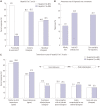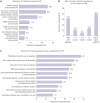Liver Diseases in South Korea: A Pulse Check of the Public's Knowledge, Awareness, and Behaviors
- PMID: 36444544
- PMCID: PMC9760893
- DOI: 10.3349/ymj.2022.0332
Liver Diseases in South Korea: A Pulse Check of the Public's Knowledge, Awareness, and Behaviors
Abstract
Purpose: National surveys in Korea have spotlighted suboptimal levels of awareness among the public towards liver-related health and diseases, leading to progressive reform of national policies and education efforts. This study aimed to assess the status of the Korean public's knowledge towards liver-related diseases.
Materials and methods: A self-reported, cross-sectional, web-based questionnaire study was conducted between February-March 2020 among 1000 Korean adults. Questionnaire items assessed the knowledge, awareness, and behaviors towards liver-related health and diseases.
Results: About half (50.9%-52.1%) knew untreated/chronic viral hepatitis could lead to liver failure and/or cancer. Misconceptions pertaining to viral hepatitis transmission risks exist with only 26.3% knowing viral hepatitis B cannot be transmitted by dining with an infected individual. About one-fifth (22.2%) were aware of an available cure for viral hepatitis C. Less than half were aware of the risk factors associated with nonalcoholic steatohepatitis (NASH), despite 72.4% and 49.5% having heard of fatty liver disease and NASH, respectively. More than one-third were unlikely to seek medical consultation even if exposed to viral hepatitis risk factors or upon diagnosis with a liver condition. Reasons for this low urgency included costs-related concerns, perceptions of being healthy, and the viewpoint that the condition is not life-threatening.
Conclusion: The public's knowledge towards liver-related diseases in Korea was found to be lacking, which could account for a lower sense of urgency towards screening and treatment. More efforts are needed to address misperceptions and dispel stigma in an effort to encourage pro-health seeking behaviors.
Keywords: Hepatitis B; awareness; hepatitis C; knowledge; nonalcoholic fatty liver disease.
© Copyright: Yonsei University College of Medicine 2022.
Conflict of interest statement
Myunghwa Kim and Jin Youn are employees of Gilead Sciences, Korea. Shikha Singh is an employee of Kantar Health. Sang Hoon Ahn has acted as advisor and investigator for Gilead, Janssen, AbbVie, Roche, Assembly Biosciences, Arbutus, Brii, Vaccitech, GSK, Inovio, Aligos, Vir Biotechnology, SL Vaxigen, GeneOne Life Science, GreenCross, Yuhan, Samil and Ildong. Hye Won Lee declares no conflicts of interest.
Figures




References
-
- Sepanlou SG, Safiri S, Bisignano C, Ikuta KS, Merat S, Saberifiroozi M, et al. The global, regional, and national burden of cirrhosis by cause in 195 countries and territories, 1990-2017: a systematic analysis for the global burden of disease study 2017. Lancet Gastroenterol Hepatol. 2020;5:245–266. - PMC - PubMed
-
- World Health Organization. Global health sector strategy on viral hepatitis, 2016–2021. [accessed on 2020 December 14]. Available at: https://apps.who.int/iris/bitstream/handle/10665/246177/WHO-HIV-2016.06-... .
MeSH terms
Grants and funding
LinkOut - more resources
Full Text Sources
Medical

